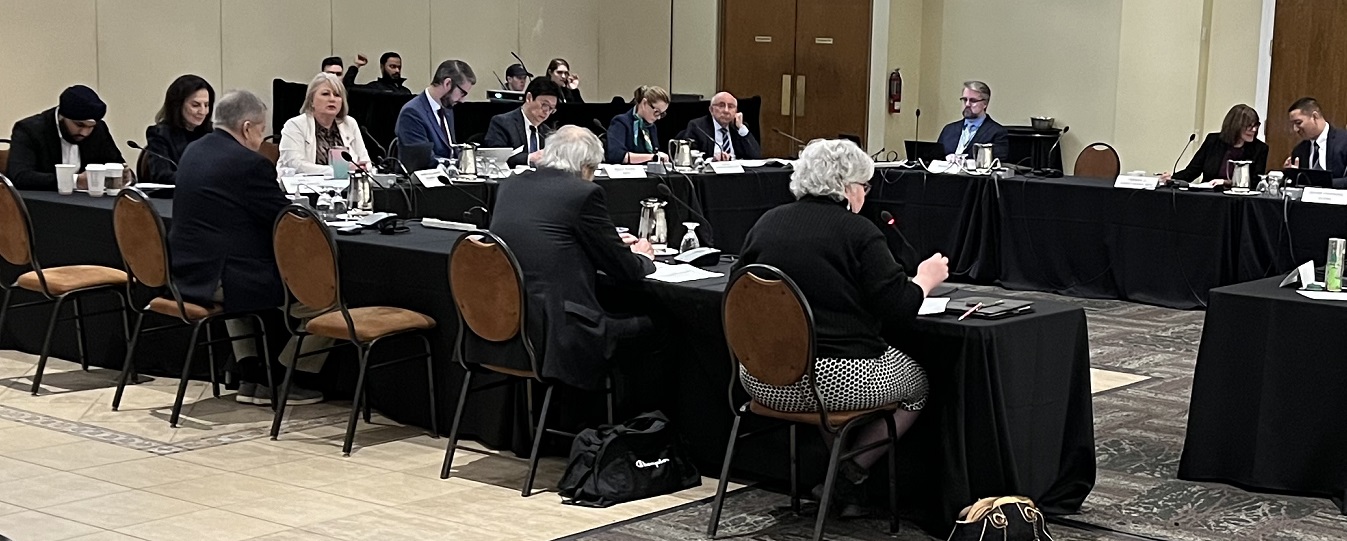
On Thursday, January 11, the provincial Standing Committee Hearing on the Study of Regional Governance arrived at the Burlington Convention Centre, on the border of Oakville, to listen to some of Halton’s elected officials - and a few residents for good measure.
Seven Conservative MPPs and one representative from each of the NDP (Official Opposition) and Liberals (Independent member) were in town to gather input on whether or not the eight regional governments in Ontario should continue as they are, be dissolved, or have changes made to the existing structures.
Similar meetings have been, or will be, held in Barrie, St. Catharines, Brampton, Ajax, Vaughan and Kitchener.
The Halton session heard from Halton Regional Chair Gary Carr; Oakville Mayor Rob Burton; and a contingent from the City of Burlington. Also in attendance, though not speaking were councillors from Halton Hills, along with Oakville councillors Sean O’Meara, Janet Haslett-Theall, and Nav Nanda.
Carr, unsurprisingly, recommended the status quo. He spoke of the work carried out by the regional government and the high credit rating the region enjoys when it needs to take out loans for lower levels of government to take on large projects.
"We are speaking with both the committee members, like we did today, and the Minister, and telling them that the region has services that are important, that we have a 97% approval rating, and we’re always going to work with improvement in mind. We’ve got a great region and we’d like to keep it that way," Carr told Oakville News.
Burton, who also made a presentation to the committee last fall in Barrie, chose to recommend a different approach – arguing for downloading many of the responsibilities back down to the local level.
Ontario created the regional government system in the early 1970’s to amalgamate smaller towns and villages, and pool their resources to cover the cost of providing services such as police, waste management, major roads and social services.
Since then, several regional systems - including in Toronto and Hamilton - have been dismantled as the cities grew.
The Region of Peel, made up of the cities of Mississauga, Brampton and Caledon, was due to be dissolved on at the end of this year, but the province reversed that decision after the municipalities examined the financial burden that would befall them in setting up their separate set of services.
As Haslett-Theall, Nanda and O’Meara sat in silence in the audience, Burton presented the committee with a 66-page report, ‘Single Tier Governance Options Final Report’ prepared by town staff and consultant Ernst & Young.
Burton spoke of the history of Oakville, the fact that Oakville’s taxpayers contribute some $35 million more to the region than they receive in return in services, and that local politicians represent their local constituents (as opposed to councillors from Halton Hills or Milton making decisions that affect Oakville).
After his presentation, Burton spoke to Oakville News, saying, "Oakville was a single-tier city 50 years ago. It had its own police, its own wastewater (treatment), its own landfill, it had everything that a city needs. It was approximately 62,000 people. Surely Oakville, at 230,000 and the 12th largest city in Ontario, probably could be a single-tier city."
Burton added, "We pay so much more than our per capita share of Halton’s cost. There’s at least $35 million worth of room to be better off."
However, as reported in an earlier Oakville News article, Burton’s opinion on the status of the region is not the official town council position, and isn't shared by all councillors.
Read more: In a Halton divorce, who will take out the trash?
In that article, Ward 3 councillor Janet Hassell-Thiel is quoted as saying, "One of the things that concerns me is that we are already, as a town, on the public record of a direction that we may take. And yet, we haven’t consulted the public. This council wasn’t even consulted about the position (in Barrie). And it strikes me that that is just not appropriate."
Ward 1 councillor Sean O’Meara told Oakville News after the Burlington session, "If the Mayor wants to propose a single-tier level of government, then he should put a resolution before council."
O’Meara stressed that council and the public need more information before they reach a conclusion about levels of government and who will be responsible for public services. He noted the confusion dropped unsuspectingly on the councils that make up the Region of Peel.
"We should have a full discussion with residents. How do we feel as a community?" asked O’Meara.
In contrast to Oakville’s approach, Burlington’s representatives displayed a unified front. Mayor Marianne Meed-Ward and Councillors Paul Sharman and Rory Nisan each fielded questions and gave their rationale for a judicious approach. Efficiency and effectiveness were their priorities.
At its January 8 council committee meeting, Burlington’s municipal leaders decided that it was foolish to jump into a choice between single or multi-level governance without knowing the costs, and which services would be better delivered alone or shared with others. City staff were directed to prepare a report within 90 days.
As more than one Burlington councillor stated at that meeting, with the province flip-flopping on the whole governance process, it's prudent to gather all the facts first, and even then, recognize that the provincial government might change its mind again.
The Standing Committee continues hearings in the next few weeks, travelling to Brampton, Ajax, Vaughan and Kitchener to hear from representatives in those regions.